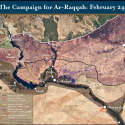The Syrian Kurdish-led Syrian Democratic Forces (SDF) have seized the majority of ISIS-held territory in the eastern countryside of ar-Raqqah in ongoing efforts to isolate the city. The SDF
launched the third phase of
Operation Euphrates Wrath on February 4 with the stated objective of
seizing the eastern countryside of ar-Raqqah City. The SDF attacked south towards ar-Raqqah City along two axes from SDF-held territory east of the town of Ayn Issa, reportedly
seizing 98 villages and hamlets northeast of ar-Raqqah City by February 12. The SDF
connected these two axes on February 11 and was approximately 5 km
northeast of ar-Raqqah City as of February 17. The SDF subsequently
announced the second stage of phase three on February 17 and launched
two axes of attack in a pincer movement to seize the Raqqa-Hasakah highway and encircle ISIS-held territory in Northern Deir ez Zour Province. The SDF simultaneously advanced south from newly seized territory on the Raqqah-Hasakah highway and
seized the village of
Judaydat Khabour on February 21, thereby weakening ISIS’s ability to resupply ar-Raqqah City. The SDF are now positioned to complete the isolation of ar-Raqqah City and subsequently transition to the next phase of seizing the city.
The U.S.’s main partners in Syria, the SDF and Turkey, are competing to lead operations to seize ar-Raqqah City and solidify their influence over post-ISIS governance. The SDF are currently advancing towards the city with
increased U.S. material support, and have
requested heavy weapons and additional armored vehicles to counter ISIS’s strength in urban combat. The SDF and affiliated political parties have also begun
solidifying relationships and
alliances with local Arab tribal leaders in order to create a
governance structure of SDF-friendly local notables similar to the structure established by the SDF in
Manbij City. Turkey, meanwhile, has
demanded that the U.S. end its support for the SDF and
proposed two alternative plans for a Turkish approved force to seize ar-Raqqah City. Turkey’s plans, however, will likely not beas effective in combating ISIS in ar-Raqqah City as a U.S.-supported SDF assault on the city and will fail to achieve U.S. strategic objectives for Syria. The first plan to advance along a 12-mile wide corridor from the town of Tal Abyad to ar-Raqqah City would bisect SDF-held territory east of the Euphrates. The SDF will not concede to this plan without major U.S. guarantees or Turkish concessions, and may launch counter-attacks if Turkey proceeds unilaterally. Turkey’s second proposal is an offensive from the recently seized town of
al Bab, which would require Turkish troops to advance approximately 100 miles and seize at least two heavily fortified ISIS-held towns before reaching ar-Raqqah City. This second proposal violates a
reported agreement between Turkey and Russia preventing Turkish troops from advancing south of al Bab, and pro-regime forces have already begun
advancing east towards Lake Assad in an effort to prevent Turkish-backed opposition groups from seizing vast territory.
Turkish-backed opposition groups acceptable to the U.S. likely cannot seize ar-Raqqah City without additional support from prominent Salafi-Jihadist group Ahrar al Sham. Turkey used Ahrar al Sham during the offensive on al Bab to seize territory when other Turkish backed opposition groups proved unable to effectively combat ISIS in and around the urban terrain. Turkey will likely utilize Ahrar al Sham in a leading role in a Turkish offensive on ar-Raqqah City. Ahrar al Sham’s seizure of the city would likely allow the group to dictate the composition of ar-Raqqah City’s governance structure, effectively trading control of ar-Raqqah from one Salafi-Jihadist group to another. A governance structure established by Ahrar al Sham is antithetical to U.S. strategic interests in Syria.
A U.S. failure to prevent conflict between its Kurdish- and Turkish-led partner forces in Syria could jeopardize the anti-ISIS mission in Syria. A Turkish
attack on Manbij City or an attempt to bisect Kurdish territory could instigate a wider armed conflict that would distract both major U.S.-partner ground forces from the anti-ISIS fight in ar-Raqqah City. The U.S. must also set conditions to prevent the resurgence of Salafi-Jihadism after the seizure of ar-Raqqah City by ensuring that the city is governed by representatives of its population rather than another Salafi-Jihadist group or a Kurdish puppet.


